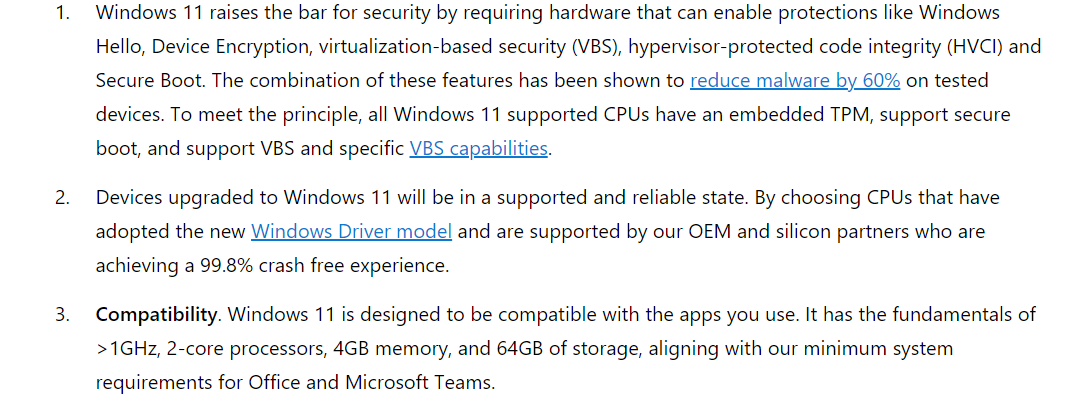Microsoft To Test 7th Gen Intel, 1st Gen Ryzen on Windows 11
Microsoft Will Test 7th Gen Intel, first-gen Ryzen for Windows 11 via Insider Builds
Microsoft released a blog post today in an attempt to assuage confusion over the system requirements for Windows 11.
The post goes over justification for the system requirements, but also says that Microsoft is open to expanding the lists that cut off at a handful of Qualcomm processors, 8th Gen Intel and AMD's second-gen Ryzen chips.
"As we release to Windows Insiders and partner with our OEMs, we will test to identify devices running on Intel 7th generation and AMD Zen 1 that may meet our principles," the post reads. "We’re committed to sharing updates with you on the results of our testing over time, as well as sharing additional technical blogs."
Microsoft is justifying the new system requirements by stating that Windows 11 is far more secure, including potentially reducing malware by 60% and featuring better encryption and biometric support. A notable security feature is using virtualization-based security, which should pass TPM through to virtualized machines.

Additionally, Microsoft is opting for processors that work with the latest Windows drivers and work with the minimum specs for Office and Teams. Part of the security requirement comes from Microsoft requiring TPM 2.0.
The company specifies "fundamentals" of speeds over 1 GHz, dual-core processors, 4GB of memory and 64GB of storage, which still includes a number of PCs that are years old and are not on the current list of supported processors.
It's good to see that Microsoft is considering including more processors, as a number of perfectly capable PCs still use those chips. (Including a number of Microsoft's Surface devices that are still on sale right now!) When Microsoft debuted the list of chips, it angered many enthusiasts who still have perfectly capable PCs, and who suggested that it would create e-waste and force people to get new computers in the middle of a global component shortage.
This testing will come from Windows insider builds, so it's up to the early-adopter community to see how it fares. The first Windows Insider preview for Windows 11 is live now.
Microsoft is temporarily removing the PC Health Check app that let you know if your Windows 10 PC could handle Windows 11.
"Based on the feedback so far, we acknowledge that it was not fully prepared to share the level of detail or accuracy you expected from us on why a Windows 10 PC doesn’t meet upgrade requirements," the post reads. "We are temporarily removing the app so that our teams can address the feedback."
The post promises that tool will be back online before general availability in the fall.
Get Tom's Hardware's best news and in-depth reviews, straight to your inbox.

Andrew E. Freedman is a senior editor at Tom's Hardware focusing on laptops, desktops and gaming. He also keeps up with the latest news. A lover of all things gaming and tech, his previous work has shown up in Tom's Guide, Laptop Mag, Kotaku, PCMag and Complex, among others. Follow him on Threads @FreedmanAE and BlueSky @andrewfreedman.net. You can send him tips on Signal: andrewfreedman.01
-
dimar Tip for Microsoft. Test everything from Core 2 Duo SSE 4.1+ support. Don't let good working systems go to trash.Reply -
digitalgriffin I don't get why Ryzen 1000, won't work. Ryzen 2000 is the same silicon on a different process node.Reply -
Heat_Fan89 I guess Microsoft doesn't want what happened when they released Vista. Lesson looks to be learned.Reply -
drtweak Kind of stupid to leave out 7th Gen and 1st Gen when those two were the first to support ONLY windows 10 (yea i know you can still install the old stuff but not without it bugging you or driver hacks).Reply -
Spectre4444 Microsoft reconsiders hard and soft limits on Windows 11 hardware requirements due to massive backlash. So they have not tested Windows 11 on other configurations ? really ? Now they are going to test out their new improved OS...they are just testing the waters to see how far they are going to have to walk back their requirements. I am all for increased security in an OS but the implementation / introduction to win 11 makes me think that we are not quite there yet.Reply -
ThatMouse Microsoft wants you to leave your 6th gen Intel and less on Windows 10 for another 4+ years. Whatever Microsoft.Reply -
ezst036 Microsoft keeps putting together strong advertisements for Linux.Reply
My system won't be compatible. I think they're doing me a favor. -
xitroff Installed to 12-year old HP 6720s without a TPM and Secure boot (UEFI) Tweet with a screenshotReply -
dehjomz If they’re gonna support Kaby Lake 7th gen, they should also support Skylake 6th gen… i mean both chips can run in the same motherboard!Reply